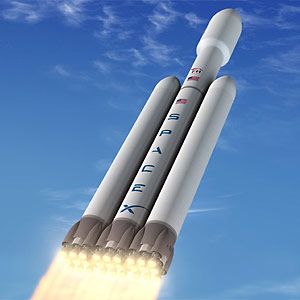Space: Next California frontier
by Joseph Perkins | May 18, 2012 12:38 pm
 [1]May 18, 2012
[1]May 18, 2012
By Joseph Perkins
The dawning of the commercial space age begins Tuesday. That’s when SpaceX[2] is expected to launch from Cape Canaveral in Florida for a rendevous with the International Space Station — the first time a private spacecraft will do so. A Saturday launch was canceled [3]due to technical problems.
SpaceX, the Hawthorne, Calif. space transport company, was co-founded in 2002 by Elon Musk, who currently serves as its CEO. He is one of the Golden State’s great entrepreneurs, having also co-founded PayPal and Tesla Motors.
Musk is persuaded that the commercial space industry is going to lift off.
“There are some similarities to the commercial awakening of the Internet in 1994,” he said, “when the Internet went from being almost an entirely government and academic institution to getting commercialized and accessible to the general public.”
California companies led the way in commercializing the Internet. It remains to be seen whether the Golden State will play a similar role in the growth of the commercial space industry.
As it is, the nascent industry already generates more than $200 billion a year in economic activity, according to the Federal Aviation Administration’s Office of Commercial Space Administration.
And with the federal government ending its half-century monopoly on space, Musk and others expect exponential growth in the commercial space business.
Florida wants to remain the center the space industry, which, during the Space Shuttle program, contributed $8 billion a year to the Sunshine State’s economy, while also accounting for more than 40,000 jobs.
But there’s no reason California can’t compete for the lion’s share of commercial space industry.
Indeed, while SpaceX will launch its Falcon 9 rocket with its Dragon capsule from Florida’s Cape Canaveral, Musk will monitor the launch from SpaceX mission control inH awthorne.
After docking with the space station, after delivering its payload of more than 1,000 pounds of food and supplies for the station’s crew, Falcon will return not to Florida, but to California. It will splash down two weeks from now in the Pacific Ocean, a safe distance off the San Diego coast.
Californi acould have been the site of tomorrow’s historic SpaceX launch, just as surely as it is the site of the spacecraft’s scheduled return to earth. In fact, a 235-foot Delta IV rocket was launched into space last year from Vandenburg Air Force Base.
A private launch facility here in California would make the state extremely competitive withFlorida. No longer would commercial space companies, most of which are based here in the West Coast, have to ship their spacecrafts all the way to Cape Canaveral, as SpaceX was forced to do. They can save time and money by launching right here in California.
Thanks to the federal government,Florida enjoyed a near monopoly on space-related activity from the Gemini program to the Space Shuttle program. But we have now entered the era of commercial space activity. And California should compete with Florida to be the industry’s hub.
- [Image]: http://www.calwatchdog.com/2012/05/18/space-californias-next-frontier/spacex-rocket/
- SpaceX: http://www.spacex.com/company.php#company_overview
- A Saturday launch was canceled : http://www.msnbc.msn.com/id/47486307/ns/technology_and_science-space/?ocid=ansmsnbc11
Source URL: https://calwatchdog.com/2012/05/18/space-californias-next-frontier/